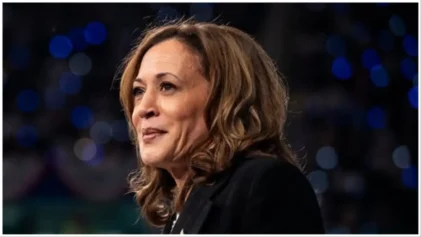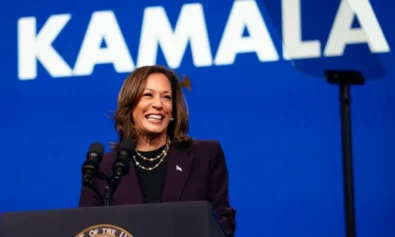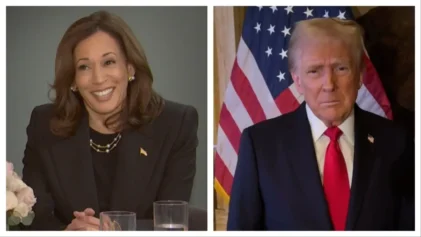Vice President Kamala Harris has accepted the Democratic nomination to run for the 47th president of the United States, marking a historic moment as the first Black and South Asian woman to make it past the primaries with enough delegates to face a viable Republican candidate.
Harris is both of African and South Asian descent but identifies as Black. Her “Blackness” has been called into question despite her parents’ passion for civil rights that planted the seed for justice that she touts so heavily during her campaign.

Like past President Barack Obama, she, too, represents the American Dream.
During a recent CNN interview, Harris asked about Trump questioning her identity and his notion that she is only claiming she’s Black for political gain.
“Same old tired playbook,” she responded to the reporter. “Next question, please.”
DANA: Trump suggested you happened to turn black recently for political purposes..
— Benny Johnson (@bennyjohnson) August 30, 2024
KAMALA: "Next question, please." pic.twitter.com/kb9niY58oj
For those who need an education lesson, here’s a look at the historical roots of Kamala Harris’ parents.
Donald and Shyamala’s Love Story
Harris’ parents, the late Dr. Shyamala Gopalan and Donald J. Harris, represent the fusion of two distinct cultures.
Shyamala, an Indian immigrant, and Donald, a Jamaican who immigrated to the U.S. with some Irish ancestry, met as undergraduates at the University of California, Berkeley. Their love story began in 1962 when they attended a study group for Black students known as the Afro-American Association. Shyamala was easily welcomed into the group as a person of color from another British colony.
Donald and Shyamala’s connection was immediate. The then 24-year-old Donald was described as charming and commanded attention. At one gathering, he stepped up and delivered a speech about his experiences growing up under British colonial power in Jamaica, Shyamala was captivated, according to The New York Times.
After the talk, she introduced herself, marking the beginning of a relationship that would soon lead to marriage.
“This was all very interesting to me, and I daresay, a bit charming. At a subsequent meeting, we talked again, and at the one after that. The rest is now history,” Donald recalled.
Within a year of meeting, the couple tied the knot, altering the course of Shyamala’s life. Initially planning to return to India after her studies, Shyamala instead chose to stay in America, starting a family that would eventually produce a daughter who would break political barriers.
“I came to study at UC Berkeley. I never came to stay. It’s the old story: I fell in love with a guy, we got married, pretty soon kids came,” Shyamala once said.
Shyamala and Donald would marry in 1963. Harris was born in 1964, and her younger sister, Maya Harris would arrive in 1967. The children reputedly sang in a choir at a local Black church and lived two doors down from a black-owned nursery school.
The Divorce
Harris’ parents’ marriage, while passionate and seemingly rooted in shared activism, did not last. By 1971, when the future vice president was close to being 5 years old, the couple was in the process of divorcing.
The former San Francisco district attorney noted in her 2019 memoir, “The Truths We Hold,” that Donald and Shyamala “loved each other very much, but it seemed like they had become like oil and water.” The pressures of their young marriage and demanding careers eventually led to her parents’ separation.
Shyamala assumed primary responsibility for raising the first female vice president and her younger sister.
Despite the challenges, Shyamala worked tirelessly to provide for her daughters. Harris recalled her mother packing lunches early in the morning and helping with homework after long days at work. Although the two sisters lived primarily with their mother, they spent weekends and summers with their father, who had moved back to Northern California to work at Stanford University.
The Matriarch: Shyamala Gopalan
Shyamala, who succumbed to colon cancer in 2009, was born to a Tamil Brahmin family. She faced limited opportunities as a woman aspiring to study science. Undeterred, she applied to UC Berkeley to pursue a degree in biochemistry, driven by her dream of curing cancer. Her father supported her ambition, using his retirement savings to fund her first year of tuition.
Harris’ mother, a University of Delhi graduate, came to America when she was only 19.
Shyamala’s siblings would describe her as a “feisty, and mischievous” kid who he often skipped school with and got into trouble,” according to USA Today.
After earning her doctorate in nutrition and endocrinology from UC Berkeley, she became a distinguished breast cancer researcher. Her career included positions at prestigious institutions such as the University of Illinois, the University of Wisconsin, and McGill University’s Lady Davis Institute for Medical Research in Canada.
Shyamala’s contributions to the field of hormones and breast cancer were substantial, earning her numerous honors and recognition as a peer reviewer for the National Institutes of Health.
Harris often credits her mother for shaping her values and career.
“To the woman most responsible for my presence here today, my mother, Shyamala Gopalan Harris, who is always in our hearts,” she said after being elected vice president in 2020. She has proudly applauded her mother, a “five-foot-tall brown woman with an accent.”
Who Is Donald J. Harris?
“At the park, my mother would say, ‘Stay close.’ But my father would say, as he smiled, ‘Run, Kamala, run. Don’t be afraid. Don’t let anything stop you,” Harris once said in a speech while discussing her father. “From my earliest years, he taught me to be fearless.”
Donald grew up in Jamaica — before the country gained independence from the U.K. — and had attended British-run schools all his life. Just like the memory that the vice president had of her dad, he seemed to live his life fearlessly.
By the time he decided to pursue a doctorate in economics, he was drawn to the U.S., which appeared to be a “lively and evolving dynamic of a racially and ethnically complex society.”
Following Donald’s graduation from UC Berkeley in 1966, the young husband and father became an economics professor. He worked at several universities in the Midwest before returning to Northern California to work at Stanford University.
VP Harris's Dad, Grand and Great Grand…. #KamalaHarris2024 #Paris2024 #NABJ24
— Da_Skeptunes (@Robin_Volpi) July 31, 2024
Who Is Donald Harris, Kamala Harris' Father and Renowned Stanford Professor?
First Black scholar to be granted tenure in Stanford's Department of Economics. pic.twitter.com/dIEhgKDhak
While he was only scheduled to stay at the university for two years as a visiting professor, students campaigned for the department to make more of a commitment to “radical political economics.” Donald, who was described as a “Marxian economist” by The Stanford Daily in 1974, was asked to remain at the school as a full-time professor in 1975.
Donald went on to teach at Stanford for more than two decades, during which he traveled around the world. He served as an associate fellow and a faculty fellow at Cambridge University and as a visiting professor at Yale University, among others.
In 1998, he retired from Stanford, earning the title of professor emeritus.
In addition to his academic achievements, Donald played a significant role in shaping economic policy in Jamaica, serving as a consultant to the government. His contributions were recognized in 2021 when he was awarded the Order of Merit, Jamaica’s third-highest honor.
Despite his illustrious career, Donald has remained largely absent from his daughter’s political life.
He was notably missing from the 2024 Democratic National Convention and has not publicly commented on her career since 2019, when he criticized a remark she made about marijuana use.
Harris once had quipped, “Half my family’s from Jamaica. Are you kidding me?”
Donald responded to Jamaica Global Online, stating that his ancestors “must be turning in their grave right now” at the association of their Jamaican identity with “the fraudulent stereotype of a pot-smoking joy seeker.”
The Complications of Identity
Harris’ identity as a mixed-race woman has been the subject of intense scrutiny and misinformation, complicating her campaign as many defend her Blackness. Even former president, Donald Trump, questioned if she was really “Black” or just claiming it to pander to a certain community.
Despite the distraction, Harris has remained steadfast in her self-identification.
“I’m Black, and I’m proud of being Black,” she stated in a 2019 The Breakfast Club interview with hosts DJ Envy and Charlamagne Tha God, addressing the rumors. “I was born Black. I will die Black, and I’m not going to make excuses for anybody because they don’t understand.”


